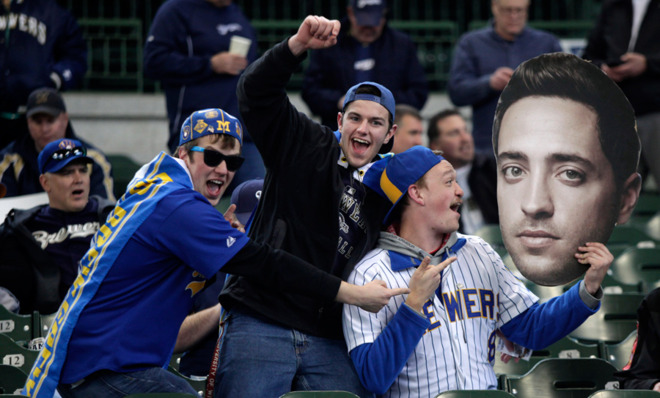Milwaukee Brewers fans gave a drug cheat a standing ovation — and you should, too
We can forgive players without forgetting their failings


A free daily email with the biggest news stories of the day – and the best features from TheWeek.com
You are now subscribed
Your newsletter sign-up was successful
Milwaukee Brewers star Ryan Braun is a cheater. After being caught in the Biogenesis scandal last year, the former National League MVP admitted to using performance-enhancing drugs and accepted a season-ending suspension.
Yet in Monday's season-opener, Brewers fans gave Braun a standing ovation in his first plate appearance since coming clean. Predictably, some took umbrage with the applause:
The Week
Escape your echo chamber. Get the facts behind the news, plus analysis from multiple perspectives.

Sign up for The Week's Free Newsletters
From our morning news briefing to a weekly Good News Newsletter, get the best of The Week delivered directly to your inbox.
From our morning news briefing to a weekly Good News Newsletter, get the best of The Week delivered directly to your inbox.
Are Brewers fans really a bunch of cheater-loving dummies? Of course not. There are a couple of problems with this kind of moral pooh-poohing, which manages to run right over some basic notions of fandom and justice.
There is absolutely no reason to be surprised Brewers fans would cheer for their hometown hero, even though he cheated and lied. Fandom is a form of tribalism, which means loyalty lies with the team, not the players. Transgressions by someone on the team can be forgiven, while transgressions by someone against the team cannot. It's why Cavaliers fans turned on LeBron James when he ditched them for Miami, and why Red Sox fans still hate Roger Clemens.
As Jerry Seinfeld astutely joked, fans are in the end "rooting for the clothes."
There's a lot of precedent for this. San Francisco swooned over Barry Bonds as he chased the home run record; the Cardinals welcomed Mark McGwire back despite his tainted past; Dodgers fans cheered Manny Ramirez when he returned from a PED suspension. Heck, the Yankees faithful gave MLB's greatest villain and centaur enthusiast Alex Rodriguez a big ol' bear hug even as he was facing an unprecedented suspension for being a lying, PED-using jerk.
A free daily email with the biggest news stories of the day – and the best features from TheWeek.com
So yes, it's okay for fans to forgive their own guys. And that forgiveness should extend to other players as well. To do otherwise is not only hypocritical, but unjust.
A basic premise underlying our criminal justice system is that people be punished in accordance with their crime, no more, no less. They shouldn't be turned into permanent outcasts incapable of redemption. There are gradations of criminality, of course, and some crimes are so horrific their perpetrators don't warrant forgiveness. But no one would suggest that a low-level criminal be blacklisted from employment and vilified for life for a single offense.
In the case of Braun and others, the offense is incredibly mild: using a banned substance to cheat at a game. And the cheaters have already been punished under the terms of a joint drug agreement between the league and players. In other words, they've done their time. To say they should be ostracized everywhere they go and booed by even their own team's fans is ridiculous.
The Cardinals' Matt Holliday nailed it this offseason when he welcomed new teammate Jhonny Peralta — who was suspended last year for using PEDs — despite his personal objections to steroid use. "I am against PEDs and always will be,'' he said, "But I also am a forgiving person and he served his suspension. That's the rules of the game."
I get it. To some, baseball is a sacred sport, and affronts to the game or its hallowed record books are damnable offenses.
But there is a distinct difference between forgiving and forgetting, and you can do one without also doing the other. Players can and should be forgiven for screwing up, but their accomplishments will always come with an asterisk. And perhaps that's punishment enough.
Jon Terbush is an associate editor at TheWeek.com covering politics, sports, and other things he finds interesting. He has previously written for Talking Points Memo, Raw Story, and Business Insider.
-
 What are the best investments for beginners?
What are the best investments for beginners?The Explainer Stocks and ETFs and bonds, oh my
-
 What to know before filing your own taxes for the first time
What to know before filing your own taxes for the first timethe explainer Tackle this financial milestone with confidence
-
 The biggest box office flops of the 21st century
The biggest box office flops of the 21st centuryin depth Unnecessary remakes and turgid, expensive CGI-fests highlight this list of these most notorious box-office losers
